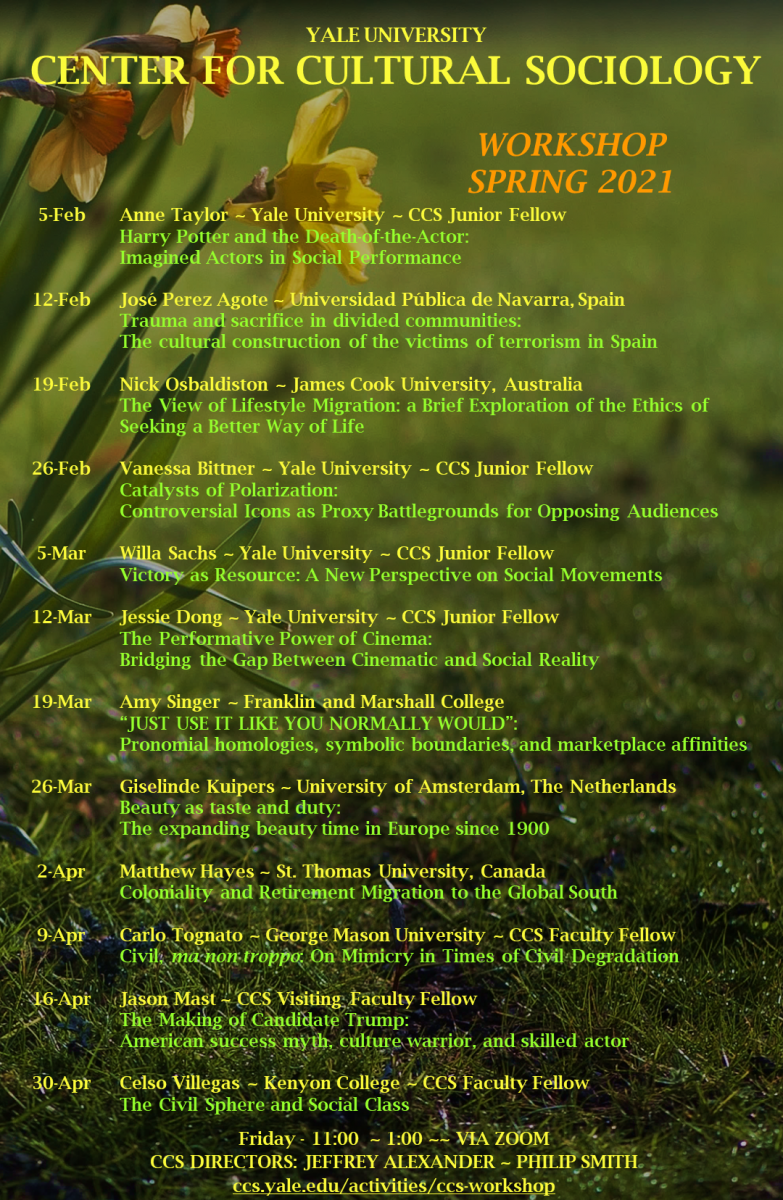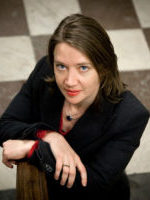|
St. Thomas University, Canada
This chapter looks at an ideal-type cultural narrative of global inequality and cultural difference from the perspective of lifestyle retirement migrants to Essaouira, Morocco. One way that retirees from Europe make sense of global-scale inequalities in their everyday lives in Essaouira is by switching between cultural codes that refer to material inequality and hardship on the one hand, and essentialized cultures of work and consumerism on the other. By accounting for material inequalities through narratives about culture, lifestyle migrants mark distance between themselves and other global migrants. The effect is to reproduce a form of epistemic coloniality, which helps to stabilize global hierarchies that might otherwise be challenged through a relational sociology.
|
|
George Mason University ~ CCS Faculty Fellow
Abstract: In Alexander’s civil sphere theory civil translation is the process by which members of society recast their particularistic interests in general terms for the purpose of eliciting the solidarity of their fellow-members. To that end, they tap into the civil codes of liberty and repression that make up civil discourse by attaching to their own motives, relations, and institutions the positive attributes of the civil and by bestowing upon those of their adversaries the attributes of the anti-civil. Occasionally, though, some members of a civil community may selectively designate the very same motives, relations, and institutions as civil when they relate to them and as anti-civil when they refer to their adversaries, while resorting to alternative non-civil binaries to determine who stands with them or against them. At times, when public spheres are highly compartmentalized, some may also hide, misrepresent, manipulate, or lie in ways that would be hardly possible if they could be held by their adversaries to a symmetric standard of truthfulness, accountability and transparency and, yet, they still tap into civil discourse and put on a civil face before their own audiences while at it. Such an asymmetric use of civil discourse and its deployment just as an ad hoc appendage on alternative non-civil conceptions of social life markedly depart from the practice of civil translation by which civil communities weave the solidary fabric that binds their members together. Most importantly, though, it defies one crucial function of civil translation, which is to transform antagonistic understandings of conflict that are rooted in non-civil conceptions of social life into agonistic and pluralistic ones that are necessary to support civil interactions. Such a practice constitutes an instance of civil mimicry and works as a conduit through which non-civil understandings of social life may be injected into the cultural fabric of civil communities. Where civil life is robust and vibrant, civil mimicry is just a residual practice. When society, instead, walks down the path of civil degradation, civil mimicry tends to become increasingly more frequent and systematic. In this paper, I will discuss the practice of civil mimicry in Trump’s America.
|
|
CCS Visiting Faculty Fellow
This paper details the making of Donald Trump’s public persona. It identifies the meaning structures assembled about him over the course of his four decades in and out of regional and national spotlights. It identifies the myths and narratives that constituted him as a public figure, and which were in place at the opening of the campaign season in 2015. A few symbolic forms combined to constitute Trump’s persona on the eve of the 2016 presidential campaign season. However imperfectly, the American success myth, adorned with gunslinger and urban gangster imagery, structured public representations of the figure for much of his early career in the public spotlight. During the decade preceding his campaign launch, the reality television show The Apprentice repackaged his image by producing atop his tabloid genre excesses a veneer of the “celebrity entrepreneur,” a figure defined by authority, decisiveness, seasoned instincts, and quasi-magical skills. Finally, in the five years leading up to his campaign launch, Trump cultivated the representation of being a fighter for the interests of the nation’s core publics and a protector of its cultural and geographic integrity. This is key. These two symbolic domains combined to create something greater than the sum of their parts. To the extent that Trump was constituted as a hero of the success myth, his authority to classify certain publics as either deserving or undeserving grew amongst his supporters.
|












